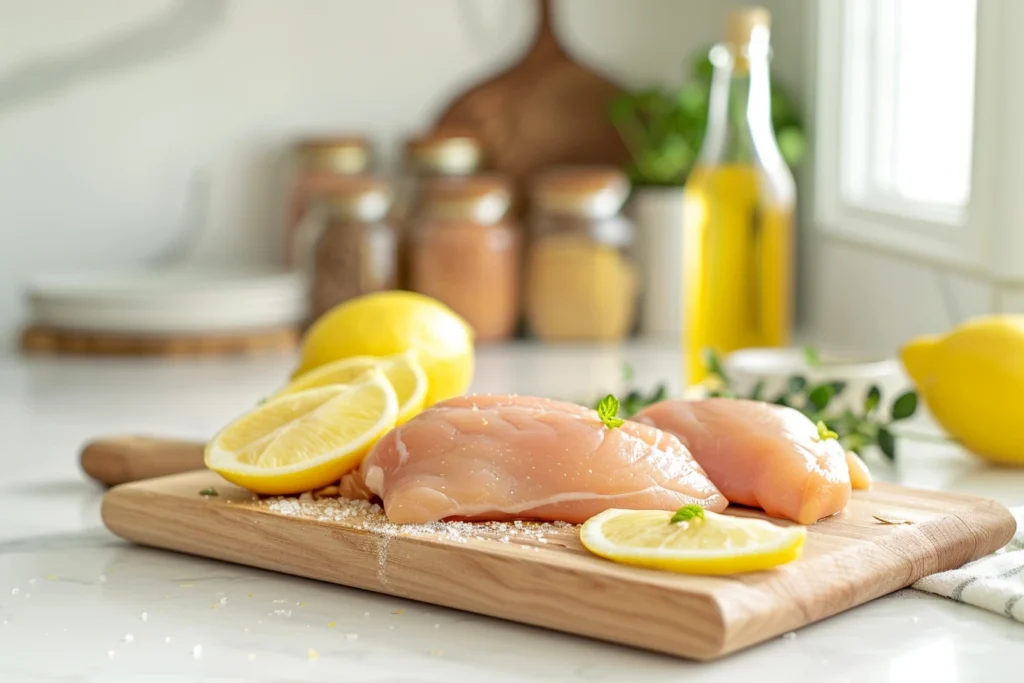Rubbing lemon on chicken has long been a staple in kitchens worldwide. But what exactly does this simple act achieve? From enhancing flavor to tenderizing meat, the humble lemon holds secrets that elevate your chicken dishes to the next level. This article delves deep into the culinary, health, and scientific benefits of using lemon on chicken, offering practical tips and insights you can use right away. Whether you’re a curious foodie or a seasoned chef, you’re in for a tangy treat.
Introduction and Background
What Does Rubbing Lemon on Chicken Do?
Using lemon in cooking isn’t just a culinary trend; it’s a time-honored tradition. Lemon, with its tangy zest and acidic punch, transforms chicken into something extraordinary. It works its magic by adding flavor, tenderizing the meat, and even offering nutritional perks. This small yet mighty fruit creates a harmonious balance between science and taste, ensuring your chicken turns out delectable every time.
Rubbing lemon on chicken isn’t just about the flavor—it’s also about food safety and texture. The acid in the lemon juice can break down proteins in the meat, which makes the chicken softer and juicier when cooked. Moreover, it serves as a natural preservative, extending the freshness of raw chicken by fighting bacteria.
Historical and Cultural Significance of Using Lemon in Cooking
The tradition of using lemon in food preparation has roots in diverse cultures. Across the Mediterranean and Middle East, citrus fruits have been prized not only for their taste but also for their preservation qualities. Historical records show that marinating meats with acidic agents like lemon juice has been a common practice for centuries, primarily to enhance flavor and preserve freshness in warm climates.
In Mexican, Asian, and North African cuisines, citrus often features in marinades, sauces, and even garnishes, with lemon leading the charge. Its versatility and accessibility make it a global favorite for everything from casual meals to fine dining recipes.
This historical significance underscores why lemon remains a kitchen hero even in modern times. By understanding its culinary and functional roles, you’ll unlock techniques that will elevate your chicken dishes in ways you never imagined.

Culinary Benefits of Rubbing Lemon in Chicken
Enhancing Flavor Profile
When it comes to flavor, lemon is an absolute game-changer for chicken dishes. The acidity of lemon juice brightens the taste, cutting through the natural richness of the meat and leaving a fresh, tangy note. This flavor enhancement works particularly well in roasted, grilled, or baked chicken recipes, where the citrusy kick complements the savory undertones of the meat.
Moreover, lemon acts as a flavor amplifier when combined with other ingredients. Pairing it with herbs like thyme, rosemary, or parsley creates a symphony of taste that is both sophisticated and comforting. Whether you’re cooking a classic lemon-herb chicken or experimenting with global cuisines, lemon ties the flavors together seamlessly.
For best results, rub fresh lemon juice on the chicken skin and cavity before cooking. You can also zest the lemon to release its essential oils, which add an even more pronounced citrus aroma.
Tenderizing the Meat
The tenderizing effect of lemon juice is one of its most prized benefits. The acid in the juice breaks down protein structures in the chicken, softening the fibers and ensuring the meat becomes tender and juicy. This process, known as denaturation, alters the texture of the chicken, making it less chewy and more flavorful.
Interestingly, lemon is a gentler alternative to other acidic tenderizers, such as vinegar. It doesn’t overpower the natural taste of the chicken, which makes it ideal for subtle and balanced marinades. But there’s a fine line to tread—too much lemon or overly long marination can lead to a mushy texture.
To achieve the perfect balance, marinate your chicken with lemon juice for 30 minutes to 2 hours, depending on the cut. Thicker pieces like thighs can handle longer marination, while thinner cuts like breasts require less time.
Marination Techniques with Lemon
Marination is where the real magic happens. Rubbing lemon on chicken isn’t just about sprinkling some juice; it’s a thoughtful process that can elevate your dish. Start by squeezing fresh lemon juice over the chicken and massaging it gently to coat all surfaces. This ensures that the acidic properties of lemon reach every part of the meat.
For added depth, mix lemon juice with olive oil, garlic, and herbs like oregano or basil. The oil acts as a carrier for the flavors, while the lemon juice works to tenderize the meat. To create a complete marinade:
- Combine the juice of one lemon with two tablespoons of olive oil.
- Add minced garlic, a pinch of salt, and your favorite herbs.
- Let the chicken soak in this mixture in the refrigerator, covered, for optimal absorption.
Marinating with lemon is particularly effective for grilling or roasting, as the slight caramelization during cooking enhances the tangy notes without making the dish overly acidic.
Health and Nutritional Benefits of Rubbing Lemon on Chicken
Lemon’s Antibacterial Properties
Did you know that lemon juice is a natural antibacterial agent? When rubbed on raw chicken, it helps reduce the bacterial load on the surface, which is especially important for food safety. The acidity in lemons creates an environment that is hostile to harmful bacteria, such as salmonella or E. coli, which can thrive on raw meat if not handled properly.
While it’s not a substitute for thorough washing or cooking, rubbing lemon on chicken acts as an additional protective step, particularly in reducing odors from raw meat. For those conscious about hygiene, this natural solution is an excellent alternative to chemical treatments.
Boosting Nutritional Content
In addition to its culinary perks, lemon also adds a nutritional boost to chicken. Rich in vitamin C, lemon supports the immune system, aids in iron absorption from the chicken, and contributes antioxidants that help combat free radicals in the body. These antioxidants may reduce inflammation and improve skin health, making lemon a health-boosting ingredient in your meals.
Moreover, the essential oils in lemon zest contain compounds like limonene, which have been linked to digestive health benefits. Adding lemon to chicken doesn’t just make your meal tastier—it also makes it healthier.
Lemon as a Natural Preservative
Rubbing lemon on chicken before cooking also helps preserve its freshness. Lemon juice, with its high citric acid content, slows the growth of spoilage-causing bacteria, keeping the chicken fresh for longer. This natural preservative quality is particularly useful in warmer climates or when storing chicken for short periods before cooking.
For best results, rub the juice of a freshly squeezed lemon over the chicken and refrigerate it immediately. This step not only extends the chicken’s shelf life but also infuses it with a zesty aroma that lingers even after cooking.
Chemical Interactions and Cooking Science
The Science Behind Lemon and Proteins in Chicken
The interaction between lemon juice and chicken is more than culinary—it’s pure science. The acidity in lemon juice primarily comes from citric acid, which plays a key role in the denaturation of proteins in the chicken. When these proteins come into contact with the acid, their structure changes, making the chicken tender and easier to chew.
This denaturation process also creates tiny pockets within the meat, allowing flavors to penetrate deeply. That’s why marinated chicken often tastes more flavorful than unseasoned cuts. Additionally, the citrus enzymes found in lemon juice help break down connective tissues, giving the chicken a smoother texture once cooked.
Avoiding Overuse of Lemon
While lemon can work wonders for chicken, overusing it can backfire. If left on the chicken for too long, the acid may break down the proteins excessively, leading to a mushy texture. This is especially true for delicate cuts like chicken breast, which require shorter marination times compared to thicker cuts like thighs or drumsticks.
To strike the right balance, always stick to recommended marination durations:
- Thin cuts: 30 minutes to 1 hour.
- Thicker cuts: 2 to 3 hours.
- Whole chicken: Up to 4 hours but no longer.
Additionally, pair lemon with complementary ingredients like olive oil or yogurt to temper its acidity. These combinations help create a balanced marinade that enhances the chicken without overpowering it.
Practical Applications and Recipe Ideas

Quick Lemon-Rubbed Chicken Recipes
Adding lemon to chicken doesn’t have to be a time-consuming process. Here are a few simple recipes you can try to bring out the best in your chicken dishes:
- Grilled Lemon Chicken
Combine the juice of two lemons, olive oil, minced garlic, salt, and black pepper to create a quick marinade. Coat the chicken thoroughly, let it sit for 30 minutes, and then grill until golden brown. The charred edges and tangy flavor are perfect for summer barbecues. - Lemon-Herb Baked Chicken
For a comforting baked option, rub chicken with a mixture of lemon juice, rosemary, thyme, and a drizzle of olive oil. Bake in a preheated oven at 375°F (190°C) until the chicken is juicy and tender. - Lemon-Infused Chicken Soup
Add freshly squeezed lemon juice to a simmering pot of chicken soup to brighten its flavor. The citrusy kick pairs beautifully with root vegetables and herbs like parsley and dill.
These recipes highlight how lemon can elevate chicken to suit any occasion, from quick weekday meals to elaborate dinner parties.
Pairing Lemon Chicken with Side Dishes
A perfectly prepared lemon chicken deserves equally delicious accompaniments. Here are some side dishes that pair beautifully with this tangy dish:
- Rice Pilaf: The mild, nutty flavor of rice pilaf complements the zesty notes of lemon chicken. Adding a splash of lemon zest to the rice brings the dish together.
- Grilled Vegetables: Bell peppers, zucchini, and asparagus grilled with a hint of olive oil and garlic make a light and colorful side.
- Fresh Garden Salad: A salad with crisp greens, cherry tomatoes, and a simple lemon vinaigrette mirrors the citrusy flavor of the chicken.
- Mashed Potatoes: Creamy mashed potatoes provide a comforting contrast to the bright acidity of lemon.
Pairing the right side dishes enhances the overall experience of the meal, making it both balanced and memorable.
Common Questions and Misconceptions
Does Lemon Make Chicken Juicier?
A common misconception is that lemon juice directly makes chicken juicier. In reality, lemon works by breaking down proteins, tenderizing the meat so it feels softer and more succulent when cooked. However, it doesn’t lock in moisture or add juiciness on its own. For truly juicy chicken, use techniques like brining or cooking with moisture-retaining methods such as baking with foil or grilling at the right temperature.
Can You Use Lime Instead of Lemon?
Absolutely! While lime and lemon are both citrus fruits, they have subtle differences in flavor. Lime tends to have a sharper, more pronounced tang, while lemon offers a balanced tartness. When rubbed on chicken, lime juice can produce similar tenderizing effects and enhance the dish with a slightly zestier profile. This makes lime an excellent substitute for lemon, especially in Mexican and Asian-inspired recipes.
Does Lemon Reduce Fat Content in Chicken?
This is a myth. While lemon is often associated with lighter, healthier dishes, it does not reduce the fat content of chicken. Instead, it enhances the overall flavor, making lean chicken cuts like breasts more palatable. If you’re looking to reduce fat in a dish, focus on trimming excess skin or using cooking methods like grilling or steaming.
Does Lemon Remove the Smell of Raw Chicken?
Yes, to an extent. Rubbing lemon juice on raw chicken can help neutralize unpleasant odors. The citric acid in lemon reacts with sulfur compounds, which are responsible for the strong smell of raw poultry, reducing their intensity. This makes lemon a great natural deodorizer before cooking.
How Do I Avoid an Overly Sour Taste When Using Lemon?
To prevent the chicken from becoming too sour, use lemon in moderation. Combine lemon juice with oil, yogurt, or other neutral ingredients to dilute its acidity. Additionally, balancing lemon with sweet or savory elements like honey, soy sauce, or garlic can offset the tartness while maintaining its bright flavor.
Can I Use Bottled Lemon Juice Instead of Fresh Lemon?
While bottled lemon juice is convenient, it lacks the freshness and complexity of flavor that freshly squeezed lemon provides. Bottled versions often contain preservatives, which may alter the taste. For the best results, use fresh lemon juice, especially when rubbing it on chicken for marination or seasoning.
Frequently Asked Questions
How long should I rub lemon on chicken before cooking?
For optimal results, rub lemon on chicken and allow it to marinate for 30 minutes to 2 hours, depending on the cut. Longer marination times should be avoided to prevent a mushy texture.
Does lemon juice disinfect raw chicken?
While lemon juice has antibacterial properties, it doesn’t entirely disinfect raw chicken. Always practice proper hygiene and cook chicken thoroughly to ensure safety.
Is rubbing lemon on chicken necessary before grilling?
While not strictly necessary, rubbing lemon on chicken before grilling enhances flavor and tenderizes the meat. It’s an excellent step if you want juicy, flavorful chicken with a hint of citrus.
Can I skip the lemon zest and use only juice?
Yes, you can use only lemon juice, but zest adds an extra layer of bright, aromatic flavor that juice alone cannot provide. It’s a small addition that makes a big difference in taste.
Does lemon juice help remove chicken skin easily?
No, lemon juice doesn’t aid in removing chicken skin. However, it can help loosen the surface of the skin slightly, which may make peeling a bit easier after cooking.
Should I rinse chicken after rubbing it with lemon?
No need to rinse. Once rubbed, the lemon juice should stay on the chicken to work its magic. Cooking the chicken will neutralize any strong acidity.
Conclusion
Rubbing lemon on chicken is a time-tested method that enhances both flavor and texture while offering nutritional benefits. From its ability to tenderize meat to its antibacterial properties, lemon is a powerhouse ingredient that can transform your chicken dishes. Whether you’re using it in marinades, as a preservative, or simply for its tangy taste, this citrus fruit is an indispensable ally in the kitchen.
So, the next time you’re preparing chicken, don’t hesitate to reach for a lemon. A little squeeze can go a long way in making your meal not just delicious but unforgettable.


11 thoughts on “What Does Rubbing Lemon on Chicken Do? A Culinary and Health Guide”